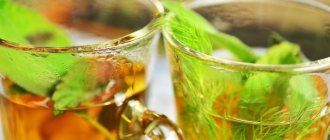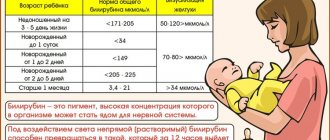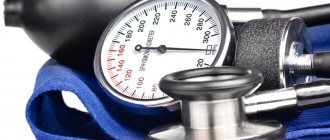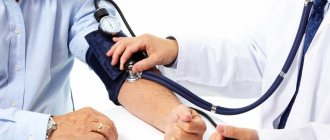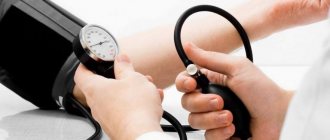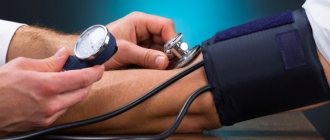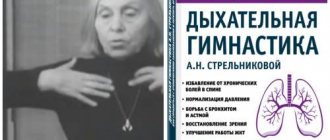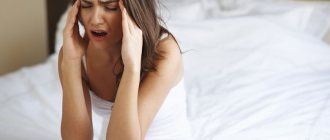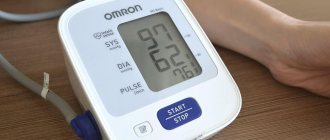27.05.2018
Last modified: August 5, 2021 at 04:42 am
Teachers, medical staff, employees of catering establishments and hazardous industries, and drivers must undergo a medical examination when hired. A medical examination is a nerve-wracking event. In response to stress, blood pressure increases in the body, which creates obstacles to successfully passing the examination and further employment. People suffering from high blood pressure in a stressful situation should know how to quickly lower this indicator.
Factors affecting blood pressure
Blood pressure is influenced by:
- blood viscosity;
- elasticity and resistance of smooth muscles of blood vessels and arteries;
- heart rate;
- the volume of blood passing through the vessels in a certain period of time.
Not all of these factors can be adjusted to lower blood pressure, but there are other reasons why the tonometer needle tends to rise.
Causes of high blood pressure:
- Smoking. Nicotine causes vascular spasms and clogs small capillaries, causing blood pressure to rise sharply and the heart to work harder. It is estimated that after smoking one cigarette, the tonometer readings rise by an average of 20-30 units and remain unchanged for 30 minutes to an hour.
- Not drinking enough. When dehydrated, the blood changes its properties and becomes thick, and the speed of blood flow decreases significantly. In order to compensate for the speed of blood movement, the vessels narrow, the heart begins to work at an accelerated rhythm, which leads to an increase in blood pressure.
- Alcohol consumption. Systematic consumption of alcoholic beverages provokes a persistent increase in blood pressure due to increased tone of the sympathetic nervous system. In people who regularly drink alcohol, systolic pressure (upper) is 9-10 units higher than in non-drinkers of the same age. The tonometer readings are affected by beer, vodka, champagne, red wine, and cognac. Doctors have calculated that after drinking 50 ml of strong alcohol, blood pressure rises for several hours.
- Salt. Consuming excess salt has a detrimental effect on the water-salt balance in the body, thereby causing increased blood pressure. Consuming more than 15 grams of salt per day contributes to the formation of edema and long-term increases in blood pressure.
- Overweight. A body mass index of more than 30 means a person is obese. With an initial degree of obesity, pressure indicators will rise on average by 5 units above normal values, with a body mass index of 35 - by 15-20 units.
- Coffee. The blood pressure of healthy people practically does not change its values after a cup of coffee. However, the body of hypertensive patients reacts to caffeine with a sharp increase in blood pressure.
- Physical exercise. A long walk, a short jog, or a quick climb up several floors of stairs increases the blood pressure monitor readings by 20 units for 30 minutes or more.
- Stress. Nervous experiences are considered one of the main causes of sudden jumps in blood pressure. Adrenaline, whose concentration in the blood increases in response to shock, fear, nervous tension or stress, sharply narrows the lumen of blood vessels and increases blood pressure.
Normalization of blood pressure with tablets
If the increase in blood pressure is caused by anxiety, mild sedatives will help:
- Magnesium tablets effectively reduce nervous excitability and prevent an increase in blood pressure. Magnesium works best in combination with vitamin B6.
- Alora is a drug whose action is aimed at reducing anxiety and psycho-emotional stress, relieving spasms. The active ingredient is passion flower extract - a natural component that does not harm the body.
- Menovalen - capsules containing extracts of valerian and lemon balm. Take for nervous overexcitation and anxiety.
- Novo-passit is a herbal preparation in liquid form that effectively combats stress and anxiety.
- Valerian is the most common herbal sedative. The convenient form of release in the form of pills allows you to take valerian under any circumstances, avoiding the persistent characteristic odor.
Important information: Lifestyle changes and home treatment
Reference. The drugs described above have an effect on blood pressure by slowly establishing a person’s psycho-emotional state. It is recommended to start taking sedative medications at least 1 week before the upcoming medical examination.
The following medications will help lower blood pressure quickly:
- Losartan prevents the narrowing of the lumen of blood vessels and helps to lower the tonometer readings after 2-3 hours.
- Lisinopril is a blood pressure lowering drug that also normalizes heartbeat and relieves headaches. Valid for 30 minutes.
- Captopril improves blood flow through the vessels and lowers blood pressure 25-30 minutes after administration.
- Diltiazem normalizes blood pressure and heart rate and begins to act within 10-15 minutes.
Use of medications, taking captopril and anaprilin before the medical examination
If a patient applying for a job has been suffering from hypertension for quite a long time, then it is impossible to do without medications.
Before a medical examination, captopril and anaprilin, as well as a number of other antihypertensive drugs, can quickly reduce levels to normal values.
Captopril is a member of the angiotensin-converting enzyme inhibitor group of drugs. Reduces peripheral vascular resistance, increases the heart's resistance to stress, and with long-term use reduces myocardial hypertrophy.
When taking the product internally, results should be expected in about an hour or a little more. With regular use of the drug, the effect is more pronounced and lasts longer. Also, this drug has a relatively small number of contraindications and possible side effects.
Anaprilin is also often used for a similar purpose. However, in the case of beta blockers, you need to be careful. These medications are not suitable for everyone.
They are prescribed with caution for bronchial asthma, as well as severe heart failure and rhythm disturbances. When used orally, results can be expected within an hour or two after administration.
ethnoscience
Simple folk methods to normalize blood pressure:
- Cold compress. It is necessary to place a piece of cloth soaked in cold water to the forehead and, if possible, to the feet. This technique allows you to stabilize your blood pressure within 10-20 minutes.
- Washing. A cold morning shower normalizes blood pressure and reduces the likelihood of further increase. In a clinic setting, it is enough to wash your face with cold water several times, wet the back of your head and sit down.
- Peppermint. Strong mint tea works not only from the inside, but also from the outside. To stabilize the pressure, you need to drink and rub mint tea with massage movements into the neck area. Inhaling the vapors of mint essential oil also helps cope with anxiety and pressure surges.
- Sugar and fir. You need to purchase fir oil at the pharmacy and drop 5 drops onto a piece of refined sugar, put it in your mouth and hold until the sugar is completely dissolved. This is a quick and reliable way to normalize blood pressure and calm down.
- Honey and lemon. Dissolve the juice of half a lemon and a tablespoon of honey in a glass of mineral water and drink. For the best effect, it is recommended to lie down or sit down for a while to relax and calm down.
Reference. For people suffering from blood pressure surges, doctors recommend that they always have a bottle of honey-lemon water with them and take a few sips each time an attack begins. This simple and harmless method copes well with high blood pressure and nervous tension.
Nutrition
There are foods that have a beneficial effect on the condition of blood vessels, the nervous system, and, consequently, blood pressure.
Products that lower blood pressure:
- Nuts and seeds are rich in oils and vitamins that strengthen the heart and blood vessels.
- Vegetables in large quantities help normalize blood pressure. Carrots, cucumbers, tomatoes, beets, and potatoes are especially useful for these purposes.
- Flaxseed oil relieves tension in blood vessels and reduces blood pressure.
- Foods rich in calcium (fish, berries, milk and dairy products) and magnesium (cereals, greens, seafood) have a strengthening effect on the heart and blood vessels, preventing pressure surges.
- Water should be drunk in the amount of 30 ml per 1 kg of weight. Both excess and lack of fluid in the body leads to increased blood pressure.
To get the best results, you should give up sugar and high-carbohydrate foods, hot spices, as well as black tea and coffee.
Important. It is necessary to reduce salt intake as much as possible. Doctors do not recommend consuming more than 5 g of salt per day for people suffering from hypertension.
Reduced pressure long before the commission
There are several ways to reduce blood pressure before a medical examination. It is best to have enough time before seeing a doctor. If this condition exists, you can lower the pressure using the following methods:
- Five to seven days before the medical examination, switch to a healthy diet. Sweets, flour and fatty foods, spicy and salty foods should be excluded from the menu. Avoid tea (especially green) and coffee. Along with this, consume more milk and dairy products, lemons, oranges, and nuts. Beetroot juice helps to lower the indicator.
- At least ten days before the medical examination, forget about the existence of alcohol and tobacco. This will not only help lower your score before the commission, but will also have a generally beneficial effect on your health.
- Some time before the medical examination, put your nervous system in order: rest more, walk in the fresh air, try to go to bed earlier, take light sedatives. For example, valerian.
Massage
An effective way to reduce tension, normalize pulse and lower blood pressure is acupressure self-massage. A massage session normalizes the condition for 30-60 minutes.
Important information: Diagnosis of hypertension
Reflex points for self-massage:
- Massage the points located 4 fingers below the kneecap at the same time for 5 minutes.
- On the neck below the back of the head there are two symmetrical notches on either side of the spine. It is necessary to apply pressure on these points with the pads of three fingers for 10 seconds. Repeat 3 times.
- Behind the ear there is a dimple near the corner of the jaw. This point must be massaged for 3 minutes.
- When the arm is bent at a right angle, a fold is formed in the bend zone. The point at the end of the fold on the outside must be massaged for 1 minute, first on one hand, then on the other.
- On the posterior midline of the head, 3 cm above the lower border of the scalp, there is another point. It must be massaged for 1-2 minutes in a sitting position.
- When you flex your toes, a dimple is formed in the middle of the foot. Massage this area for 1 minute, first on one leg, then on the other leg.
Before the massage, you need to warm your hands by vigorously rubbing them together. The pressure should not be too intense and cause discomfort.
Breathing exercises
Breathing exercises reduce blood pressure by relaxing the body and saturating cells with oxygen. All exercises must be performed standing with your feet shoulder-width apart.
Set of exercises:
- As you inhale, clench your hands into fists, and as you exhale, unclench your fingers.
- Place your fists on your waist. As you inhale, lower your hands, unclenching your fingers. As you exhale, return your arms to their original position.
- As you inhale, smoothly turn your head to the left, as you exhale, turn your head to the right. As you exhale, tense your abdominal muscles.
- As you inhale, tilt your body forward, leaving your neck and arms relaxed, and as you exhale, return to the starting position.
- Stretch your arms out to the sides, parallel to the floor, with your palms facing away from you. As you inhale, clench your fists, while exhaling, unclench your fingers.
Each exercise must be repeated 5-6 times, inhaling and exhaling through the nose.
Urgent change in pressure readings
The following techniques will help to quickly lower blood pressure without the use of medications:
- Take a warm bath (water temperature no higher than 37°C) with the addition of a few drops of soothing and relaxing essential oil (sage, bergamot, mint, lavender, geranium, frankincense). Instead of aromatic oils, you can use regular salt. The session lasts 10-15 minutes.
- Artificially slow down breathing: take a deep breath, holding your breath for 2 seconds, exhale slowly, holding your breath for 3-6 seconds. Then breathe for a minute at a normal pace and repeat. Breathe through your stomach. Over 3-4 laps, the pressure decreases by 10-20 units.
- Rub your ears for redness. For 3 minutes you need to rub your ears with random movements. This method quickly helps reduce blood pressure by 10-20 units.
other methods
If hypertension is not at an advanced stage, and also if there is no desire to poison the body with medications, you can resort to proven unconventional methods of getting rid of this disease. Let's look at the most effective ones:
- Nettle decoction. Ingredients: 20 grams of pre-dried finely chopped herbs and a glass of water. Cook over low heat for half an hour. Once ready, let it brew, strain and cool. The product must be taken three times a day before meals for two weeks.
- Lemon juice will help relieve hell. You will need to mix it with still mineral water in a ratio of one to four. You should drink not as a course, but directly when your health worsens.
- To stabilize the indicator, it is recommended to prepare and take special herbal tea immediately after waking up. It consists of plant components containing natural sedatives and enriched with vitamins and microelements. To prepare, you will need to mix dried herbs in equal quantities: chamomile, valerian, lemon balm, mint, lavender. Pour a glass of boiling water over the resulting mixture and let it brew for 15 minutes. Strain before use.
Attention! If the question arises - how to reduce blood pressure before a medical examination, this is a clear signal that there is a malfunction in the heart and the need to consult a doctor. Artificially lowering blood pressure can lead to unpleasant consequences.
Diseases for which it is difficult to pass a medical examination
There are diseases in which an applicant is highly likely to be denied a job:
- epilepsy, central nervous system disorders, mental disorders;
- skin diseases (seborrhea, psoriasis, eczema);
- period of cancer relapse;
- exacerbation of infectious diseases;
- infection with parasitic fungi, lice, worms, ticks;
- musculoskeletal disorders;
- multiple strokes and heart attacks;
- hepatitis B and C;
- hearing, speech disorders, very low vision;
- heart disease;
- tuberculosis;
- blood diseases;
- diabetes mellitus type 1 and 2 with complications;
- extreme obesity;
- drug addiction, substance abuse, alcoholism;
- diseases of the genitourinary system.
Invalid indicators
Young people who want to devote their lives to military activities, but have problems with blood pressure, should know what kind of hypertension they are taking on to serve. After passing the commission, based on the results of a medical examination and instrumental methods, conscripts are told about the likelihood of service.
Those who have pronounced symptoms of the disease, poor health, or reduced physical activity may become unsuitable. Hypertension of the 2nd degree is considered a severe pathological process; the conscript can be exempted. The presence of aggravating factors, when a diagnosis of “hypertension stage 2 risk 2” is made, leads to exemption from military service. The disease can progress and become a complication that threatens with a stroke or other dangerous consequences.
The same can happen with grade 2 hypertension, risk 3. This condition is characterized by the influence of additional factors - smoking, drinking alcohol, poor diet. Therefore, stage 2 hypertension has a great health hazard and is associated with a high risk of developing cardiovascular diseases.
In the third degree of the disease, sharp fluctuations in pressure are observed, reaching high values. Serious disturbances of vascular activity occur. Systolic pressure varies from 180 mmHg, and diastolic pressure starts at 110 mmHg.
At the second stage, there is partial fitness, based on the presence of aggravating factors, and at stage 3 of the disease, the army is unacceptable. The pressure in the arteries reaches its maximum value, health deteriorates, and the vascular system suffers greatly.
